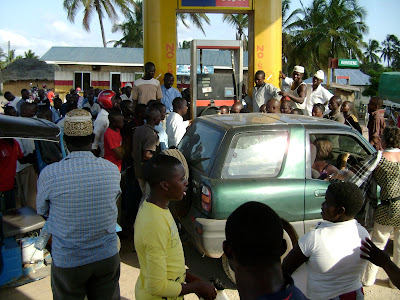I’m sitting at the Benedictine Beach House (what a saucy trio of words that is) in Mtwara with the salt wind blowing through the room like a school of ghosts. Bottle of water on my right and eight moist spiral notebooks on my left, full of nearly illegible scrawlings penned in the backs of Land Rovers bump-bumping on red, courduroy roads or in sweaty hospital hallways crowded with people sprawled on floors. There’s a jar of peanut butter here, nearly empty; a $10 wrist watch I bought at Zeller’s for this trip that is returning to its raw materials: petroleum, tin, thread; a pile of pongy seashells; some clothes I’d like to set fire to; my smudgy computer; and thou.
In fewer than 48 hours, I’ll be on a plane to Zurich and then Frankfurt and then Ottawa. It’s time to go home. You know why? Because these girls are waiting for me.
 |
| Maggie and Daisy |
As you may know, or not know, Scott Portingale and I were sent to Tanzania to track down CUSO-VSO volunteers and profile them for fundraising and volunteer recruitment. We’ve spent the last six weeks meeting two dozen teachers, doctors, nurses, and consultants of all stripes who came here for the same reason I did—to help. But help what? Help whom? Help how? Development is a tricky business. You take s step forward, you take two back, then one sideways, maybe one forward again, back one, two forward. It’s like dancing. Sometimes it’s awkward and the music sucks and you wonder why you bother trying. Sometimes you discover a rhythm you never knew you had and suddenly, you’re gliding around the room. That is, so long as you have a partner.
The key to development here, in my barely informed opinion, is letting go of every notion you have about Africa, emptying your mind of expectations, preparing yourself for the unexpected and—this part is important—instead of trying to “help” someone, just share what you’ve got. Share ideas, share stories and eventually, skills.
The thing about sharing is, others share back. That was the most common message we received from volunteers: “I gained far more than I gave.” But of course. Tanzania has an older, richer culture than Canada. But isn’t it telling how we don't expect our gift to be returned. Not from Africa. Western arrogance, I guess. And ignorance. Most people here don’t have a TV. They build their own houses from homemade bricks, for god’s sake. They feel the earth under their bare feet. They grow things, make soap and drive like crazy people. It’s anarchy sometimes, sure. But there’s something damn fine about it too. It’s in your face, unmediated. People grow up learning to take care of themselves instead of expecting the state to do it for them.
Now before you start saying, “Gregoire, that’s a load of sentimental crap. Tanzania’s one of the poorest countries in the world, you said it yourself!” Right, right. But poor why? It’s complicated. Poor in what way? In sustainable, indigenous economic development. Poor where? In the classroom and in the maternity ward. Now ask yourself this question: Am I poor? Poor in experience? Poor in knowledge? Poverty is not just about money. Poverty is an unexamined life. And development? Well, that happens to you, too. I encourage you, one final time, to visit the CUSO-VSO website and job board if you think you might want to step onto this whirling dance floor. And if you can’t manage to go overseas yourself, help someone else go by making a donation (click the donate button below). I’ve seen what north-south collaboration can do. It’s money well spent.
(Cue the hippie drums and Joan Baez.)
OK, here’s a picture of a stag beetle we found outside the beach house. Don’t be too impressed. It was dead. Still though, ain’t she a humdinger?
Here’s something even better, the view from the beach house where I sat drinking coffee and writing stories about inspiring people for the past three days while Scott got stung by a jellyfish—TWICE! His arm swelled up something awful. Poor dear. We made up for it by drinking Serengeti beer and eating the biggest plate of fish and chips we could find. Take that, Indian Ocean, you duplicitous turquoise temptress.
 |
| Mtwara Beach |
And here’s the end of my journey. I've eaten mangoes until my skin is orange and I still want more. I've supped on fish at roadside vendors with the flies and the ants. I've embraced the noise and fumes of Dar and languished in an ocean that was, at times, actually too warm to refresh. I loved the pili-pili chili sauce and the Africafé instant coffee and also all those sweet bananas. I've slept poorly, ate richly, sweated profusely, sunscreened lavishly, inquired incessantly, and written thousands of words. Some of them were here, to you.
What will become of this virtual monologue, I can’t verily say. Don’t worry: I won’t bore you with tales from the Canadian suburbs upon my return. But who knows? Maybe we’ll do this again sometime.
Thanks for listening, er, reading.
Maggie and Daisy: I'll be home soon.
And to Dan, who made this all possible : I love you.











